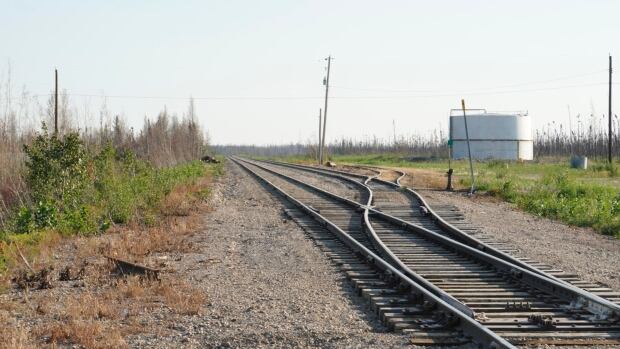
CN Rail plans to officially end rail service from Enterprise to Hay River, N.W.T.
CBC
CN Rail says it plans to officially end its rail service from Enterprise to Hay River, cutting off what territorial officials say is a key logistical section of railway and could further complicate the efforts to resupply rural N.W.T. communities.
"It has a tremendous effect on really some of the most vulnerable Indigenous communities in the North," Caroline Wawzonek, the N.W.T.'s infrastructure minister, told CBC.
CN Rail has decided not to rebuild a critical 30 kilometres of railway that got damaged in last year's wildfires.
Wawzonek said it's part of a rail and barge corridor that supplies essential goods to rural communities up the Mackenzie Valley, and Inuit communities of the High Arctic.
"Without this, by forcing communities, our community governments to be finding alternatives ... it increases costs into communities that are already paying extremely high costs for fuel," Wawzonek said.
On May 23, CN Rail started the process to discontinue this rail line.
According to an email from CN Rail, the decision followed "thoughtful engagement with local stakeholders and customers."
CN Rail declined to divulge any details about who they consulted that supported the decision, and added that the repair costs were too high for the customer volume in the region.
"Trucking to Hay River and from Enterprise will take 20 truck trips, that would take about 80 hours from Enterprise instead of six hours from Hay River. The additional handling is inefficient, can impact fuel quality, adds logistical complexity and spill risk," Wawzonek said.
The rail line is also important infrastructure used by Imperial Oil to fuel communities in the Sahtu.
In an email response, the oil company said, "In light of CN's decision, we will continue to use alternative means to transport fuel to support our customers in the region."
Brad Mapes is the owner of AWP Industries Corporation, which has a rail transloading site in Enterprise.
He disagrees with the government's prediction about the impact and says that logistical shipping has evolved as the N.W.T. has developed over the years.
"As we build more highways, we need to get [the] Mackenzie Highway up to Inuvik ... we will get less dependent on the waterways. This year is a good example, with the water levels dropped, I don't think its gonna be uncommon ... there will be less demand on barging," Mapes said





















 Run 3 Space | Play Space Running Game
Run 3 Space | Play Space Running Game Traffic Jam 3D | Online Racing Game
Traffic Jam 3D | Online Racing Game Duck Hunt | Play Old Classic Game
Duck Hunt | Play Old Classic Game